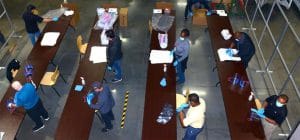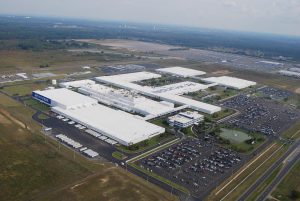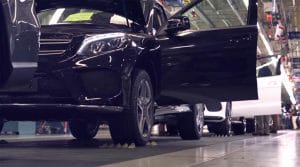Korean carmakers Hyundai and Kia have reopened their U.S. manufacturing plants, albeit on a single shift.
The two Korean siblings closed the two plants in March, about the same time most of their competitors shuttered their North American operations due to the coronavirus pandemic. Only a handful of automakers, including not only Hyundai and Kia but Mercedes-Benz have so far restarted U.S. production, with most other manufacturers hoping to reopen later this month.
Production at the Hyundai and Kia plants will begin slowly, the latter automaker pointing to “the continued effects of the COVID-19 pandemic on our supply chain.” In its statement, Kia Motors Manufacturing Georgia said its West Point facility, for now, “will limit production operations to one shift.”
(UAW remains skeptical of plans to safely reopen FCA, Ford, GM plants.)
As a result, they are expected to fall well short of capacity, at least for the near-term. Hyundai can produce up to 400,000 vehicles a year, Kia about 340,000, at their U.S. operations.
The slow ramp-up might have less impact than during other times, however, due to the near-collapse of U.S. auto sales. Demand tumbled 39% in March and about 50% in April, leaving significant inventory on dealer lots across the U.S. But there are some exceptions. Demand for pickups has remained relatively strong, drawing down dealer stocks. And sales of both Kia Telluride and Hyundai Palisade have been solid, causing some concerns as supplies of those two SUVs were already short as the pandemic swept in.

Before resuming automotive production, Kia was using its Georgia factory to make face shields for first responders.
Of the two automakers, Hyundai was first to close its U.S. plant, a facility based in Montgomery, Alabama, after a worker there tested positive for the coronavirus. Kia’s West Point plant remained open until March 30, a point by which the entire North American automotive network was grinding to a halt.
Automakers originally hoped the shutdown would be brief, many initially laying out plans to start back up by mid-April. But, as the number of infections and fatalities began to soar, those plans were pushed back.
As is the case with states laying out individual plans for lifting shelter-in-place orders, so automakers are now following their own timetables for reopening.
Mercedes-Benz was first to start back up last week resuming production on a single-shift basis at its Tuscaloosa, Alabama factory. Like Kia and Hyundai, the German maker said in a statement that it did so only after implementing “robust and best practice safety measures.”
(Ford outlines “benchmark playbook” aimed at safely reopening U.S., European plants.)
There has been an unusual degree of cross-communications between automakers during the pandemic to compare best practice approaches which include the use of masks and other personal protection equipment for workers, as well as methods to reduce direct contact within plants, both along the assembly line and in common areas such as restrooms and cafeterias.
Several other automakers are expecting to reopen within the next one to two weeks, including BMW, Honda, Tesla, Toyota and Nissan. Others have pulled back from previously announced target dates, including Fiat Chrysler, Ford, General Motors and Volkswagen.
For Detroit’s Big Three, part of the problem is the extension of Michigan’s stay-at-home order through May 28th since they all have a disproportionate share of their parts and assembly manufacturing bases in that Midwest state.
One of the questions that the industry will face as manufacturers resume production is whether they will be able to get all the parts they need. That is one of the reasons cited by Kia for its plan to operate just one shift for now. Automakers, including Ford and Toyota, have said they are working with suppliers – many of whom have suffered serious financial problems caused by the pandemic – to ensure they are ready to start back up again while meeting best practice safety standards.
(Toyota reveals “flexible” plan aimed at safely starting to re-open U.S. plants.)


